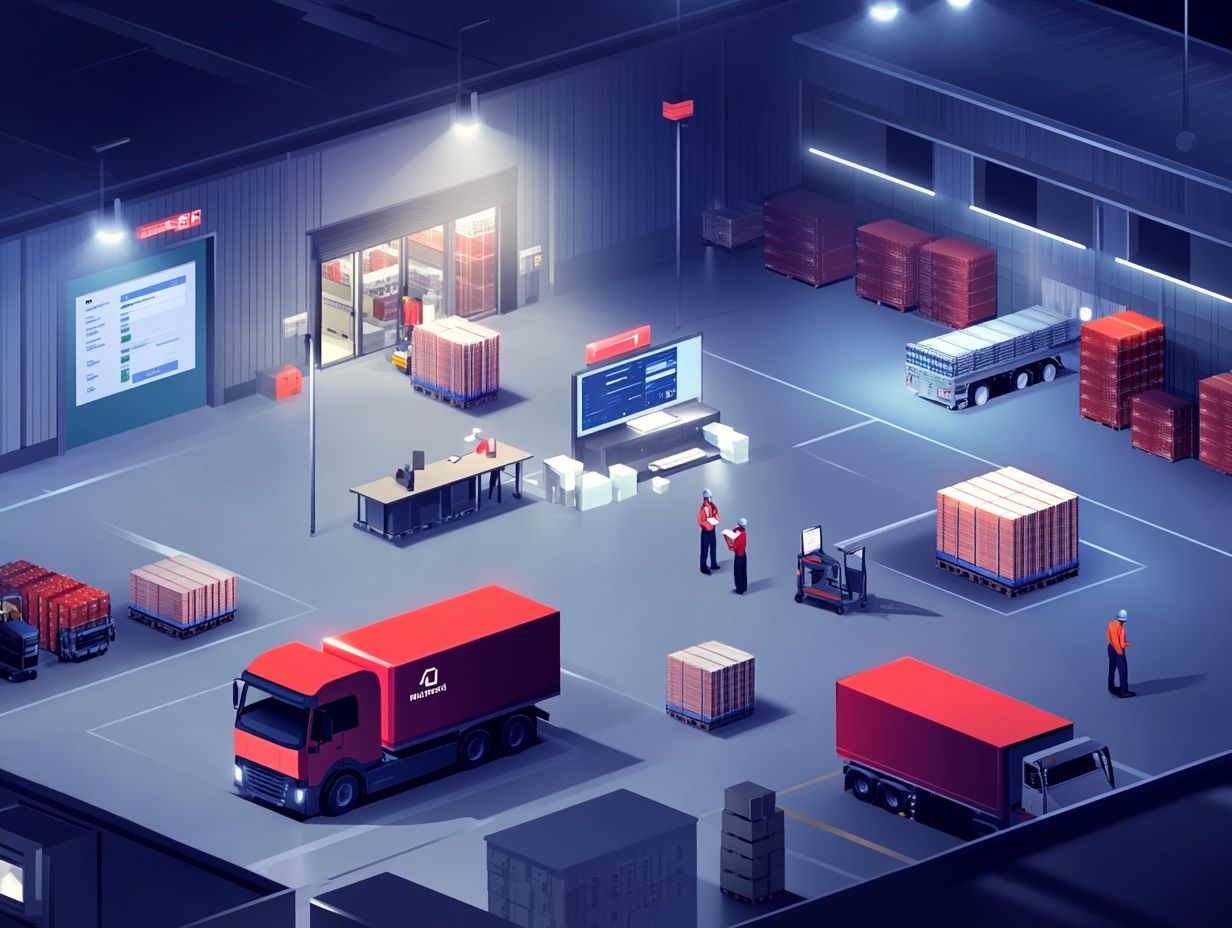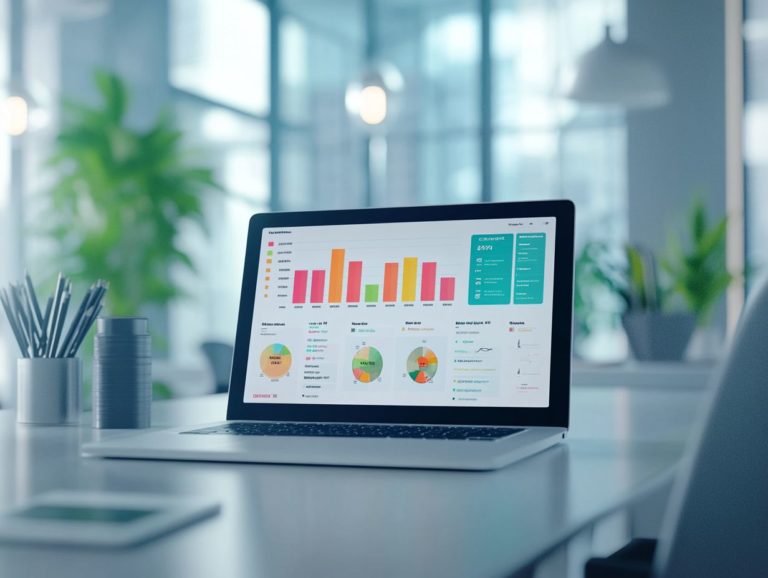18. How CRM Can Streamline Operations in Logistics
In today’s fast-paced logistics landscape, effective Customer Relationship Management (CRM) systems are essential for elevating operational efficiency and delivering exceptional customer service.
This exploration delves into the complex role of CRM in logistics. It highlights benefits like increased efficiency and cost savings while also addressing common implementation challenges.
We present best practices to navigate these hurdles and showcase real-world examples of successful CRM strategies that can transform your logistics operations.
Unlock the game-changing potential of CRM for your business now!
Contents
- Key Takeaways:
- Benefits of CRM in Logistics Operations
- Challenges of Implementing CRM in Logistics
- Best Practices for Implementing CRM in Logistics
- Case Studies of Successful CRM Implementation in Logistics
- Frequently Asked Questions
- What is CRM and how does it relate to logistics operations?
- What are the benefits of using CRM in logistics operations?
- How can CRM help with managing customer relationships in logistics operations?
- What types of logistics operations can benefit from using CRM?
- How does CRM help with inventory management in logistics operations?
- Can CRM automate any tasks in logistics operations?
Key Takeaways:

Efficiency and cost savings are key benefits of implementing CRM in logistics operations, as it can streamline processes and reduce manual labor. Improving customer experience is another key benefit of utilizing CRM in logistics, as it allows for better communication and personalized service. To successfully implement CRM in logistics, companies must overcome common challenges such as data integration and employee resistance, and follow best practices such as setting clear goals and training employees.
Defining CRM and its Role in Logistics
Customer Relationship Management (CRM) is crucial in the logistics sector, significantly enhancing operational processes. By integrating data from various stakeholders, you create a unified view of customer interactions, preferences, and demands. This unified approach enhances operational processes.
Utilizing CRM software enables you to collect and analyze data effectively, improving decision-making in supply chain management and logistics operations. This approach ultimately leads to greater customer retention and satisfaction.
With predictive analytics at your disposal, you can forecast demand fluctuations, allowing for more efficient inventory management and fewer stockouts. This functionality gives you the power to maintain optimal inventory levels, reducing holding costs while ensuring that customer needs are met promptly.
CRM systems elevate customer communication, streamlining the resolution of service issues by effectively tracking inquiries and feedback. For instance, you might leverage CRM to monitor delivery performance, enabling you to quickly identify and rectify any bottlenecks.
These proactive steps can improve delivery times, ensuring clients receive their orders on schedule, which fosters trust and loyalty.
Benefits of CRM in Logistics Operations
Implementing CRM software within your logistics operations brings a wealth of advantages. You’ll experience improved operational efficiency, enhanced customer retention, and more effective supply chain management.
These benefits culminate in driving greater profit margins for your business, positioning you for sustained success in a competitive landscape.
Efficiency and Cost Savings
CRM systems enhance your operational efficiency by providing centralized information that streamlines logistics processes, leading to substantial cost savings for your business.
This centralization gives your teams the power of real-time data on customer interactions, sales trends, and inventory levels, facilitating more knowledge-based decision making.
For example, with enhanced inventory control, you can reduce excess stock and steer clear of those costly overstock situations. CRM tools can automatically reorder products based on predefined thresholds, minimizing storage costs while simultaneously improving your cash flow.
By tracking customer preferences and purchase history, you can allocate resources more effectively, ensuring your marketing efforts target high-potential clients and ultimately leading to reduced advertising expenses.
Leveraging CRM systems can be truly transformative, enabling you to maximize efficiency and minimize operational costs.
Improved Customer Experience

The integration of Customer Relationship Management (CRM) in logistics significantly elevates your customer experience by enabling personalized interactions and enhancing communication. This ultimately boosts overall satisfaction.
This transformation gives you the power to tailor your services based on individual customer preferences and past interactions. As a result, you can foster more meaningful engagement.
For example, imagine how Amazon employs advanced CRM tools to track customer buying patterns, delivering personalized recommendations that cater to unique tastes.
In a similar vein, FedEx leverages CRM systems to provide real-time tracking information. This allows you to stay informed about your shipments and swiftly address any service issues.
By streamlining communication channels, these organizations enhance your service experience and foster loyalty. They create a sense of understanding and responsiveness in every interaction.
Challenges of Implementing CRM in Logistics
Despite the many advantages of CRM, implementing these systems within logistics presents its own set of challenges. You may encounter data integration issues and resistance from team members, both of which can significantly hinder the effectiveness of your CRM initiatives.
Common Obstacles and How to Overcome Them
Common obstacles during CRM implementation in logistics include data integration challenges and a lack of team involvement. Insufficient training on operational processes can also hinder effectiveness.
Data integration challenges often lead to fragmented information systems, which can cause inconsistent customer experiences and missed sales opportunities.
To mitigate these issues, consider investing in robust data management tools that can streamline your integration processes. Involving your team in the decision-making process not only values their insights but also enhances buy-in and commitment to the CRM system.
Comprehensive training programs empower your employees to fully utilize CRM tools, leading to improved operational efficiency and customer satisfaction.
Regular feedback sessions will help you assess the effectiveness of these strategies, allowing for ongoing adjustments and improvements.
Best Practices for Implementing CRM in Logistics
Imagine achieving a seamless CRM implementation that revolutionizes your logistics! To do this, adhere to best practices that prioritize data-driven decisions and seamless software integration.
This approach streamlines your operations and positions your business for long-term success in a competitive landscape.
Key Strategies for Success

Key strategies for successful CRM implementation in logistics revolve around leveraging team data to enhance operational performance and meet customer demands more effectively.
By adopting a customer-centric logistics approach, you can dramatically improve your interactions and responses. Utilizing CRM analytics enables you to continuously assess and refine your strategies based on real-time feedback and emerging trends.
This proactive approach allows for the identification of bottlenecks and opportunities to streamline operations. By fostering collaboration among your sales, marketing, and logistics teams, you create a holistic view of customer needs, leading to tailored solutions.
Consider the example of a leading logistics company that integrated CRM data into its routing software. This integration optimized delivery schedules based on customer preferences, resulting in a significant boost in satisfaction rates.
Case Studies of Successful CRM Implementation in Logistics
Delving into case studies of successful CRM implementation in logistics uncovers invaluable insights that help you optimize your operations. By embracing effective CRM practices, you can significantly enhance customer satisfaction, transforming the way your business interacts with its clientele.
Real-World Examples and Lessons Learned
Real-world examples of CRM success in logistics highlight strategic planning and execution. Effective CRM management can lead to major operational improvements.
Take FedEx, for instance. They have harnessed CRM strategies to elevate customer engagement, enabling real-time shipment tracking and proactive communication about potential delays.
DHL has also rolled out a customer-centric CRM platform. This makes it easier for customers to ask for help and ensures timely follow-ups, significantly boosting overall satisfaction.
These case studies show that a tailored CRM approach not only builds loyalty but also drives efficiency. By adopting similar technologies and emphasizing customer feedback, you can refine your operations and boost your competitiveness in a fast-changing market. Don t miss out on the chance to implement CRM today!
Frequently Asked Questions
What is CRM and how does it relate to logistics operations?

Customer Relationship Management (CRM) is a software system used to manage and analyze customer interactions and data throughout the customer lifecycle. In logistics operations, CRM can streamline processes and improve overall efficiency by managing customer interactions, sales, and service requests.
What are the benefits of using CRM in logistics operations?
Implementing CRM in logistics operations helps businesses increase productivity and improve customer satisfaction. Additionally, CRM streamlines operations in the supply chain and enables decisions based on data analysis, leading to cost savings.
How can CRM help with managing customer relationships in logistics operations?
CRM allows logistics businesses to centralize customer data and interactions. This makes it easier to monitor and manage customer relationships, leading to better communication, increased satisfaction, and improved retention rates.
What types of logistics operations can benefit from using CRM?
CRM can benefit all types of logistics operations, including transportation, warehousing, and distribution. It is useful for businesses of all sizes, from small startups to large corporations.
How does CRM help with inventory management in logistics operations?
CRM aids inventory management by providing real-time data and insights. Businesses can track inventory levels and monitor supply and demand, leading to better planning and reducing the risk of stock shortages or overstocking.
Can CRM automate any tasks in logistics operations?
Yes, CRM can automate many tasks in logistics operations, such as order processing, customer communication, and data entry. This saves businesses time and resources, allowing employees to focus on other important tasks.






